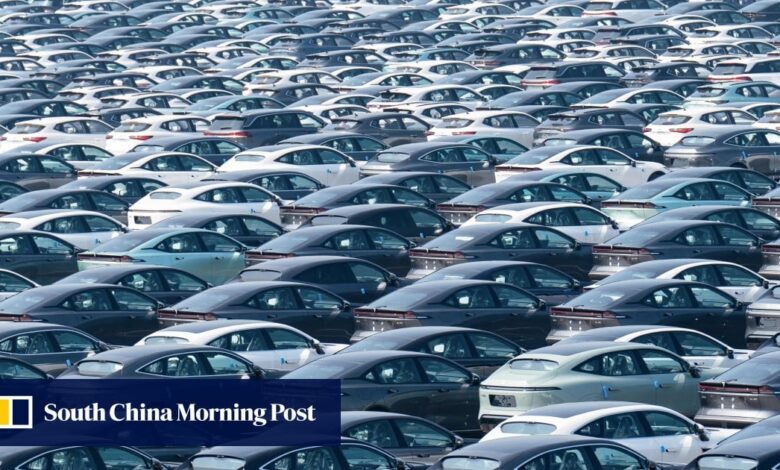China’s economic ‘risks will intensify’ in 2024, with EVs, property market, local government debts clouding prospects

[ad_1]
Overcapacity in the electric vehicle and other sectors, the ailing property market and mounting local government debts are likely to compromise economic recovery efforts and cloud China’s prospects in 2024, leading economists and academics warned on Friday.
China could kick off the new year with a bigger bounce, but momentum may taper off later as risks weigh heavier on economic growth, Shanghai University of Finance and Economics president Liu Yuanchun told a webinar.
However, business confidence and property investments have remained weak, while concerns over the sustainability of the recovery remain.
China’s economy turns corner: 7 takeaways from GDP, September activity data
China’s economy turns corner: 7 takeaways from GDP, September activity data
Liu, who was among select economists sought by Premier Li Qiang for policy recommendations at a State Council meeting last week, urged Beijing not to set China’s 2024 growth target “too low”.
“We need to set the [GDP growth goal] at 4.5-5 per cent to prove Western detractors wrong and instil confidence,” said Liu, adding the economy still had immense potential to be extracted.
Risks will intensify next year. The troubles facing the property sector are not going anywhere
China, though, would still have to contend with old and new risks next year as they may sap growth, he added.
Liu said Beijing should consider new reform commitments at a key political event later this year to inject positivity and to address a host of challenges to continue to build momentum.
Top cadres of China’s Communist Party are set to convene the third plenum of the 20th party congress in coming months, with the gathering typically focusing on economic issues. Hopes have mounted that the meeting could roll out forceful measures to consolidate the recovery footing for the coming months.
“Risks will intensify next year. The troubles facing the property sector are not going anywhere. Home prices in Beijing and Shanghai are stabilising, yet not so in Guangzhou or Shenzhen, and lower-tier cities face bigger uncertainties,” added Liu
“We don’t know how developers’ debt default drama will play out,” he added, while warning policymakers’ “indecision and inaction” would compound the challenge.
‘Pain could be too much’: China’s regional banks facing US$300 billion loss
‘Pain could be too much’: China’s regional banks facing US$300 billion loss
Liu also said the debt restructuring plan announced at July’s Politburo meeting “would only ease some immediate woes but won’t address underlying issues of how local governments usually binge on borrowings”.
Beijing is facing a “monumental” challenge to unwind China’s local government debt crisis, according to US rating agency Standard & Poor’s.
Liu also cautioned that China’s freewheeling electric vehicle and battery-making surge, which saw carmakers and local governments launch new projects, could lead to new overcapacity issues and stifle growth.
Such kind of revenge spending spree will wane and the sustainable way forward should be buoyant private investment
Over the past decade, as many as 500 electric vehicle start-ups have mushroomed in China, but just 200 carmakers are certified by Beijing for mass production.
“Small and underachieving players will be unable to survive and many car and battery plants will become derelict,” said Cao Hua, a partner at private-equity firm Unity Asset Management.
And after consumption contributed to almost 95 per cent of China’s gross domestic product in the third quarter, Yu Chunhai, a deputy dean at Renmin University of China’s School of Economics, also doubted if the boost to the economy would be sustainable.
“Such kind of revenge spending spree will wane and the sustainable way forward should be buoyant private investment,” said Yu.
Economists also renewed calls to boost spending, including by direct cash handouts.
Ning Jizhe, former director of the National Statistics Bureau, said in an opinion piece in the People’s Daily this month that policymakers should focus on boosting consumption, especially home and car purchases.
“The data shows the economy is improving, but there is a big gap between data and how the rank and file feel about the economy and their livelihoods,” added Yu.
[ad_2]
Source link






